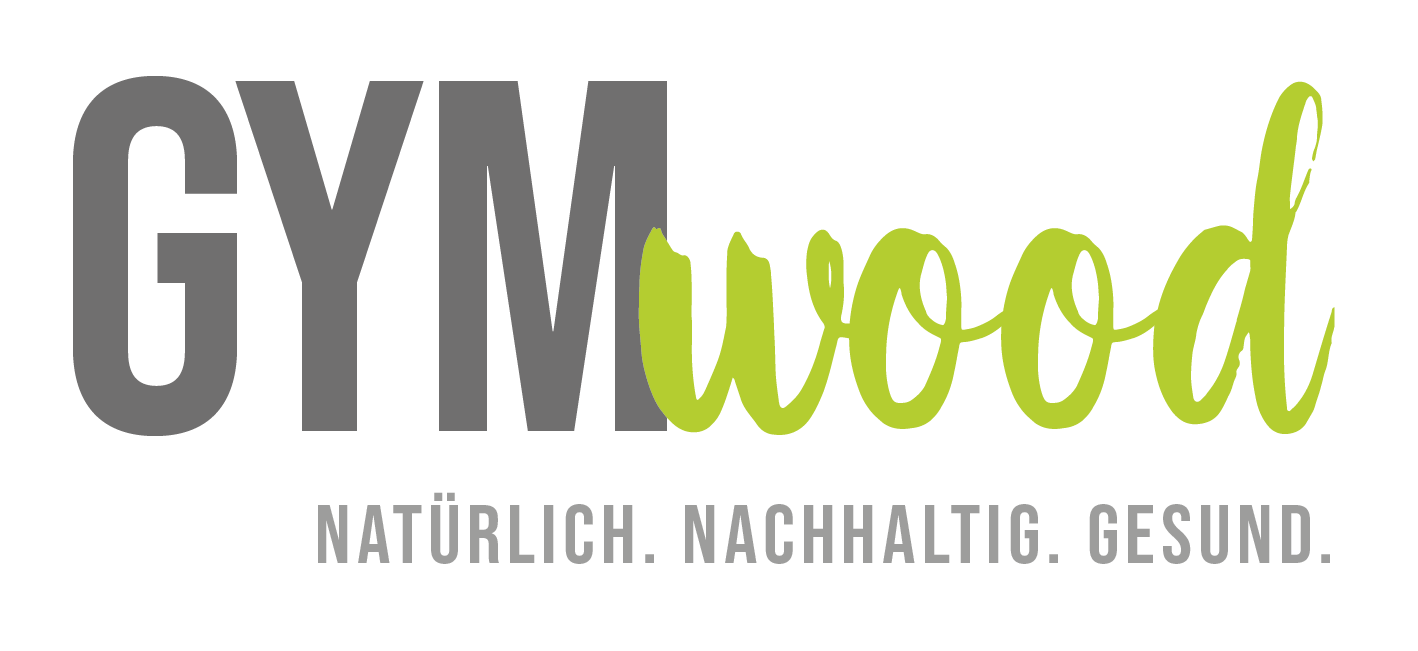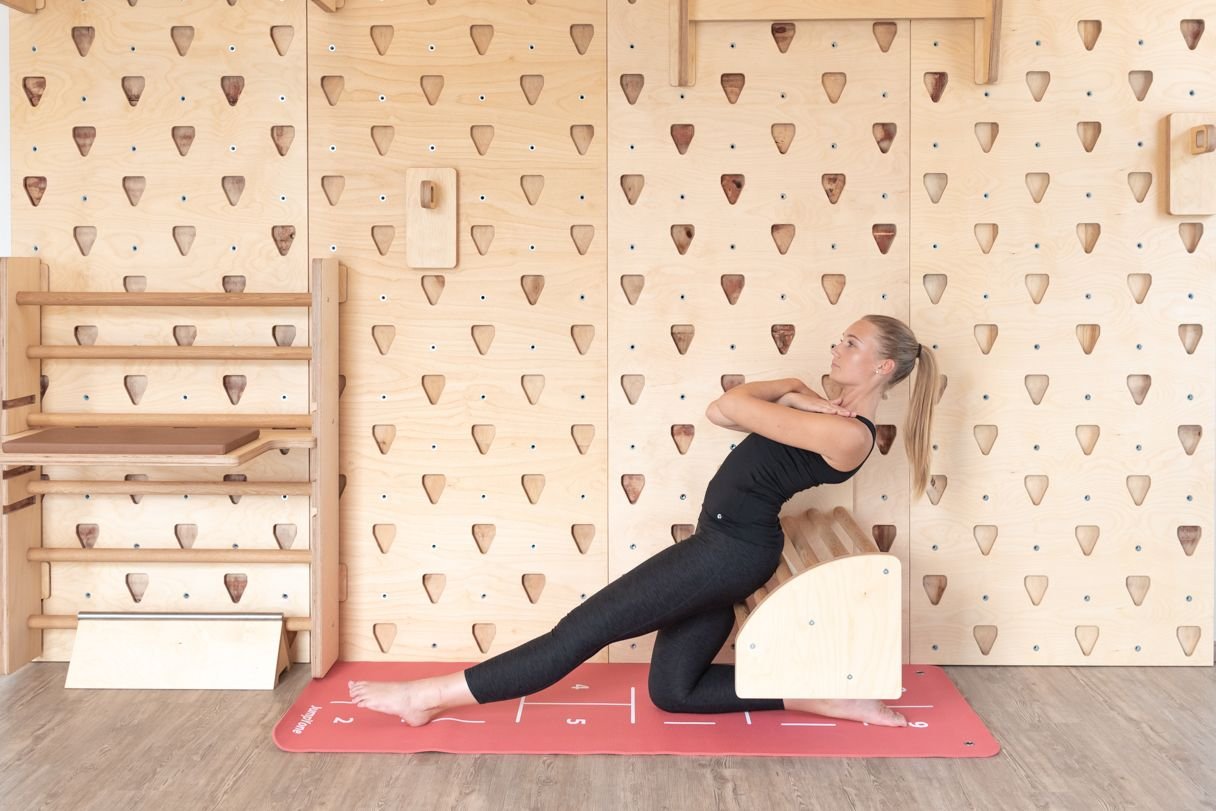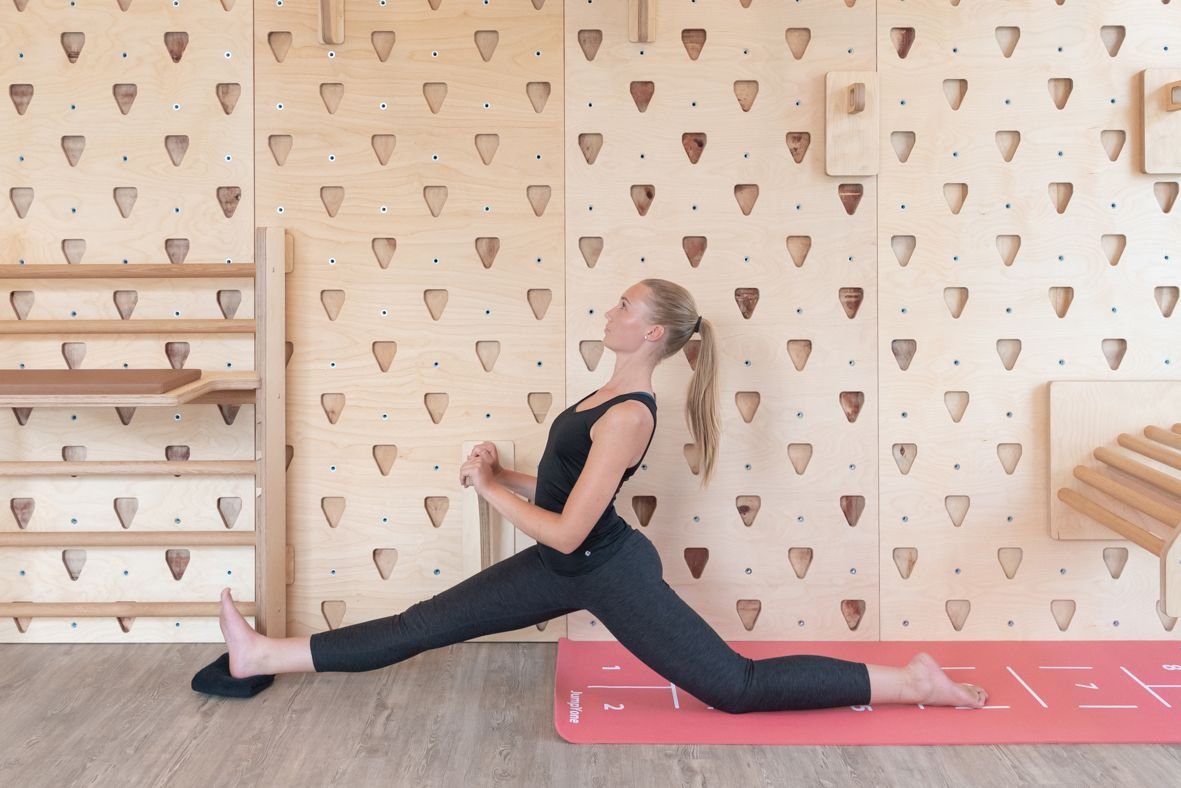
GYMwall
GYMwall - The modular wooden training wall for gyms and physiotherapies
The GYMwall from GYMwood is a high-quality, modular training wall that offers versatile training options in the smallest of spaces. Specially developed for professional use in gyms and physiotherapies, it combines functional design with an elegant wooden look to create a stylish and motivating training experience.
Thanks to the sophisticated modularity, various training modules - e.g. for personal training, physiotherapy, occupational therapy, calisthenics, yoga, Pilates, functional training or even climbing - can be attached or exchanged quickly and easily. The GYMwall grows with your requirements and adapts flexibly to your space thanks to different basic sizes in width and height.
The robust wooden construction not only ensures durability, but also gives every training area a warm, natural atmosphere. The combination of functionality, design and modularity makes the GYMwall training wall the perfect solution for studios and practices that focus on quality and flexibility.
The GYMwall is certified for medical approval and meets the requirements for professional use in therapeutic and rehabilitative environments - a quality feature that guarantees maximum safety and effectiveness.
Here's how
All exercise videos with
the exact execution
to our GYMwall
can be found on our
YouTube account
stand with Flexvitband
-
Psoas Major
Quadriceps Femoris
Rectus Abdominis
Diaphragm -
Knee | Hip | Spine
-
Ventral muscle chain
-
Suction feet on the floor
Push your hips forwards with a soft, springy movement
Sternum diagonal to the ceiling
Head in extension of the spine
-
Lean upper body as far back as possible and keep tension in the front chain.
neck
-
Sternocleidomastoid
Suboccipital muscles
Levator scapulae
Trapezius
Skaleni musculature
-
LWS
-
Ventral and dorsal muscle chain
-
Adjust the castor to head height
Entire back against the wall
Knees stretched, shoulders remain lowered
Push arm down
Look straight ahead, head without rotation
only tilted to the side
-
Move the pelvis to the side and keep tension in the neck muscles.
Hip
-
Psoas Major
Quadriceps Femoris
Rectus Abdominis
Diaphragm -
Knee | Hip | Spine
-
Ventral muscle chain
-
Keep your head in extension of the spine
Tilt your chin towards your chest
Press the instep of the foot into the ground
Push your hips forward
Sternum diagonal to the ceiling
-
Lean upper body as far back as possible and keep tension in the front chain.
Chest
-
Pectoralis Major & Minor
Psoas Major
Rectus Abdominis
Latissimus Dorsi
Diaphragm -
BWS I neck problems
-
Ventral muscle chain
-
Variant 1
Adjust the element to the center of the thoracic spine
Keep your head in extension of the spine
Tilt your chin towards your chest
Press the instep of the foot into the ground
Push your hips forward
Sternum diagonal to the ceiling
Variant 2
Adjust the element to the center of the thoracic spine
Keep your head in extension of the spine
Cross your arms
Tilt your chin towards your chest
Press the instep of the foot into the ground
Push your hips forward
Sternum diagonal to the ceiling
-
Bring extended arms as far as possible behind the pad by extending the thoracic spine and maintain muscle tension in the anterior chain.
Wade
-
Gastrocnemius
Soleus
Ischiocrural musculature
Musculature of the foot -
Knee I lumbar spine I thoracic spine
-
Dorsal muscle chain
-
Variant 1:
Scratch the triangle with your toes
Actively push your heels towards the floor
Both arms forward in extension of the back
Push your bottom straight back
Variant 2:
Position the ball of the toe on the floor triangle
Actively push your heels towards the floor
Push your bottom straight back
Variant 3:
Place the forefoot on the triangle
Actively push the feet to the ground
Press the forefoot against the floor triangle
Push your bottom straight back
-
Pull heels down as far as possible and hold the tension.
Calf with Flexvitband
-
Gastrocnemius
Soleus
Ischiocrural musculature
Musculature of the foot -
Knee I lumbar spine I thoracic spine
-
Dorsal muscle chain
-
Suck your feet parallel to the floor
Arms in extension of the spine
Knees extended
Move your buttocks towards the floor in a soft, springy motion
-
Pull heels down as far as possible and hold the tension.
Side tilt
-
Latissimus Dorsi
Obliquus Internus Abdominis
Obliquus Externus Abdominis
Quadratus Lumborum -
Neck | Spine
-
Lateral muscle chain
-
Place element at hip height
Buttocks and back on back panel
Arms upwards
Side tilt
-
Bring extended arms as far as possible behind the pad by extending the thoracic spine and maintain muscle tension in the anterior chain.
Side tilt with flexvitband
-
Latissimus Dorsi
Obliquus Internus Abdominis
Obliquus Externus Abdominis
Quadratus Lumborum -
Neck | Spine
-
Lateral muscle chain
-
Suck your feet parallel to the floor
Hips softly sprung to the floor
Arms stretched along the ligaments
-
Bring extended arms as far as possible behind the pad by extending the thoracic spine and maintain muscle tension in the anterior chain.
Leg extension
-
Adductor group of the hip joint
Latissimus Dorsi
Obliquus Internus AbdominisObliquus Externus Abdominis
Quadratus Lumborum -
Knee I Hip I Spine
-
Ventral muscle chain
-
Keep your head in line with your spine and chin towards your chest
Press the instep of the foot into the ground
Push the pelvis forward
Sternum diagonal to the ceiling
-
Lean upper body as far and straight back as possible, pivot point is at knee joint.
Balancing act
-
Ischiocrural muscles
Gastrocnemius
Soleus
Psoas major -
Knee I Hip I Spine
-
Dorsal muscle chainDorsal muscle chain
-
Variant 1:
Pull the toe of the front leg towards the nose
Upper body upright
Push leg forward
Variant 2:
Pull the toe of the front leg towards the nose
Upper body upright
Move leg sideways
-
With your pelvis straight, push your front foot as far forward as possible and maintain tension.
glutaeus
-
External rotators of the hipExternal gluteal muscles
and piriformis -
Sciatica
-
Dorsal muscle chain
-
Place stable in front of device
Put on leg
Standing leg stretched backwards
Both arms forward in extension of the back
Repeat with the second leg
-
Slide the sled backward with the knee bent, lowering the hip lower than the resting knee. Tension on gluteal muscles must be clearly noticeable. Angle of the resting leg as close to 90C° as possible at the knee.
Bridge
-
Rectus abdominis
Transversus abdominis
-
Knee I Hip I Spine
-
Ventral muscle chain
-
Variant 1:
Hook your feet into the anklet
Cross your arms in front of your chest
Slide the body over the rungs
Chin to sternum
Head in extension of the spine
Variant 2:
Hook your feet into the anklet
Stretch your arms upwards
Slide the body over the rungs
Chin to sternum
Head in extension of the spine
-
Lean back as far as you can still maintain the posture under muscle tension.
Deep squat with Fexvitband
-
back extensors
neck
Rotator cuff
Parts of the posterior shoulder
-
CERVICAL SPINE
BWS
LWS
-
Complete spine
-
Feet and knees open over hip width
Upper body stretched
Arms in extension of the body
Actively move your buttocks towards the floor in a springy manner
-
Keep your back straight in the physiological position of the spine. Let the ligaments stretch you.
Spiral with Flexvitband
-
CERVICAL SPINE
Transversus (I don't know the German name right now)
Parts of the outer thigh
Parts of the piriformis
-
CERVICAL SPINE
abdominal muscles
Outer legs
-
CERVICAL SPINE
Parts of the abdomen
Piriformis
-
Actively suction your feet to the floor
Knees extended
Rotation of the whole body
Actively move your right shoulder / hip towards the floor in a springy manner
-
Bring your chin over your shoulder. Keep your upper body upright. Use the bands to create tension in the rotation.
Myofascial trIGGER POINTS
Select trigger point
Massage selectively and relax with micro movements































